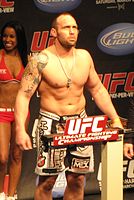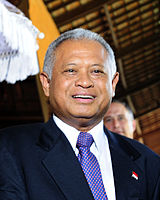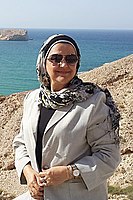Colorado School of Mines
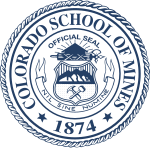 | |
Former name | Territorial School of Mines (1874–1876) |
|---|---|
| Motto | Nil sine numine (Latin) |
Motto in English | "Nothing without God's will." |
| Type | Public research university |
| Established | February 9, 1874[1] |
| Accreditation | HLC |
Academic affiliations | Space-grant |
| Endowment | $285.6 million (2020)[2] |
| President | Paul C. Johnson |
| Provost | Richard C. Holz |
Academic staff | 603[3] |
| Students | 7,101 (fall 2023)[4] |
| Undergraduates | 5,443 (fall 2023)[4] |
| Postgraduates | 1,658 (fall 2023)[4] |
| Location | , , United States 39°45′4″N 105°13′21″W / 39.75111°N 105.22250°W |
| Campus | Large Suburb, 373 acres (1.51 km2)[5] |
| Newspaper | The Oredigger |
| Colors | Blue and silver[6] |
| Nickname | Orediggers |
Sporting affiliations | NCAA Division II – Rocky Mountain |
| Mascot | Marvin the Miner Blaster the Burro[7] |
| Website | www |
Colorado School of Mines (Mines) is a public research university in Golden, Colorado founded in 1874. The school offers both undergraduate and graduate degrees in engineering, science, and mathematics, with a focus on energy and the environment. While Mines does offer undergraduate minor programs in the humanities, arts, and social sciences, it only offers degree programs in STEM fields, with the exception of economics. In the Fall 2023 semester, the school had 7,101 students enrolled, including 5,443 undergraduate and 1,658 graduate students.[4] The school has been coeducational since its founding, but enrollment remains predominantly male (68.5% as of Fall 2022).[4] It is classified among "R1: Doctoral Universities – Very high research activity".[8]
History
[edit]19th century
[edit]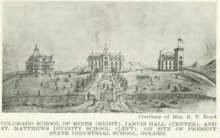
Golden, Colorado, established in 1859 as Golden City, served as a supply center for miners and settlers in the area. In 1866, Bishop George M. Randall of Massachusetts arrived in the territory and, seeing a need for higher education facilities in the area, began planning for a university which would include a school of mines. In 1870, he opened the Jarvis Hall Collegiate School in the central building of the Colorado University Schools campus just south of the town of Golden, accompanied it with Matthews Hall divinity school in 1872, and in 1873 the School of Mines opened under the auspices of the Episcopal Church. In 1874 the School of Mines, supported by the territorial government since efforts began in 1870, was acquired by the territory and has been a state institution since 1876 when Colorado attained statehood. Tuition was originally free to residents of Colorado.
In 1878, Jarvis Hall's main building and Matthews Hall were both destroyed by fires in the span of two days. The School of Mines building was the only structure of the complex left standing. Following the fires, the School of Mines enrollment grew, consisting of prospectors and mine owners. A school library was established with $250, and a gymnasium was built to support the growing student body. The school's fight song, "The Mining Engineer", the first two verses of which are still sung today, was established on campus by 1885.[9]
Following the 1880s, the School of Mines transitioned to become a 4-year university, removing its assaying certificate program. Around this time, silver and blue began to be seen as the official school colors. In 1894, Engineering Hall was completed. As the oldest building on campus, Engineering Hall originally housed the physics and drafting departments, but now houses the Division of Economics and Business.[10] The following year, the CSM Alumni Association was founded with members wearing the first instance of the school's Reuleaux triangle symbol. In 1898, Florence Caldwell became the first female graduate of the School of Mines, earning a Civil Engineering Degree.[11]
20th century
[edit]At the turn of the century, the School of Mines officially changed its name to the Colorado School of Mines. This marked the start of a long period of investment into Mines. In 1905, Simon Guggenheim donated $80,000 for the construction of Guggenheim Hall, which serves as the school's administration building.[12] On nearby Mount Zion, student Herbert Everest designed a large M made out of rocks for his senior thesis, which was constructed by 20 faculty and 250 students.[13] Also on Mt. Zion, the first experimental mine owned by the Colorado School of Mines was opened. Known as the School Tunnel, it served to train mining engineers until 1921, when the Edgar Mine was purchased and the original School Tunnel was abandoned.[14]
In 1919, tensions between the Colorado School of Mines and the University of Denver resulted in Colorado Governor Oliver Shoup threatening intervention after students from Mines held DU students and local news reporter Bill Bliss hostage in Golden.[15]
During World War II, Mines was one of 227 universities that participated in the Army Specialized Training Program by the War Department.[16] The program focused on training students in practical engineering skills for military service.
21st century
[edit]
In August 2007, a new student recreation center was completed. In 2008, the school finished expanding its main computer center, the Center for Technology and Learning Media (CTLM). In May 2008 the school completed construction and installation of a new supercomputer nicknamed "Ra"[17] in the CTLM managed by the Golden Energy Computing Organization (GECO), a partnership among the Colorado School of Mines, the National Renewable Energy Laboratory, the National Center for Atmospheric Research and the National Science Foundation. In 2014, CoorsTek granted a $27 million investment to the university, leading to the 2017 opening of the CoorsTek Center for Applied Science and Engineering, a multi-disciplinary building on campus dedicated to both academic and research activities.[18]
Since 1964, the Colorado School of Mines has hosted the annual oil shale symposium, one of the most important international oil shale conferences. Although the series of symposia stopped after 1992, the tradition was restored in 2006.[19]
Presidents
[edit]- Edward J. Mallett – 1873[n 1]
- Gregory Board – 1875[n 1]
- Milton Moss – 1878[n 1]
- Albert C. Hale – 1880[n 2]
- Regis Chauvenet – 1883
- Charles S. Palmer – 1902
- Victor C. Alderson – 1903[n 3]
- William G. Haldane – 1913
- William B. Phillips – 1915
- Howard C. Parmelee – 1916
- Victor C. Alderson – 1917[n 3]
- Melville F. Coolbaugh – 1925
- Ben H. Parker – 1946
- John W Vanderwilt – 1950
- Orlo E. Childs – 1963
- Guy T. McBride, Jr. – 1970
- George S. Ansell – 1984
- Theodore A. Bickart – 1998
- John U. Trefny – 2000
- Myles W. Scoggins – 2006
- Paul C. Johnson – 2015
Campus
[edit]
Colorado School of Mines is located to the southwest of Golden's downtown, bordered by U.S. Route 6 and Clear Creek. The campus spans 373 acres (1.51 km2),[5] and includes over a dozen academic and research buildings, indoor and outdoor athletic facilities, two student centers, a library, eight residential halls, and administration buildings. Additionally, the campus hosts a research building for the United States Geological Survey,[20] housing the National Earthquake Information Center.

Colorado School of Mines also operates the free admission Mines Museum of Earth Science, which displays rock and mineral specimens collected from Colorado's numerous mining districts, as well as around the world. Notable objects in the collection include one of the "Goodwill" Apollo 17 lunar samples and the Miss Colorado crown.[21][22]
Labriola Innovation District
[edit]The Labriola Innovation District, composed of McNeil Hall, xWorks, and the Labriola Innovation Hub (InnoHub), was opened in early 2024. Named after Frank and Mary Labriola, the InnoHub's 37,000 square feet and supporting buildings host the capstone design program, student design competition teams, and students' entrepreneurial and personal endeavors.[23] The InnoHub also consists of a machine shop, woodworking shop, composite workshop, electronics lab, tool rental center, additive manufacturing lab, and open-build space for student use.
McNeil Hall contains classrooms dedicated to cornerstone and capstone design classes, as well as a large parking structure. The Mines Police Department, Lock Smith, Environmental Health and Safety, and Parking Services are also based on the first floor.
Beck Venture Center
[edit]The Beck Venture Center provides business mentorship and support for students and faculty to build businesses. Multiple venture capitalists, angel investors, and engineering consultants maintain offices in the Venture Center to support the campus business ecosystem.[24] Mines, through the Beck Venture Center, is one of ten members of the western division of the National Science Foundation's Innovation Corps Program, which provides students and faculty with grants to pursue their inventions.[25]
Edgar Experimental Mine
[edit]The Edgar Experimental Mine is the primary educational mine owned by Mines in Idaho Springs. The mine was originally a silver and gold mine founded in 1870 by the Big Five Mining Company. It was acquired by Mines in 1921 after Big Five declared bankruptcy.[14] Edgar Mine is primarily used to train mining engineers, although it is also used by various state and federal agencies to develop a wide range of products and techniques,[26] including the U.S. Army's tunnel detection program, which built one of the mine's two portals.
The mine features a fully operational mine railway, internet system, and classroom.[27] In addition to being used by mining engineers, it is also used by electrical, biological, and civil engineering students for various projects.Edgar Mine Classroom | Rock Powered Life | University of Colorado Boulder The property also contains an outdoor explosives lab used by researchers and educational creators, like the Slow-Mo-Guys.[28]
In 2023, the FreePort-McMoRan Foundation gave $1 million to modernize Edgar Mine.[29]
Academics
[edit]Mines began the world's first graduate program in space resources in the fall semester of 2018, offering both master's and PhD degrees.[30]
University Honors and Scholars programs
[edit]Thorson First-Year Honors
[edit]The Thorson First-Year Honors program replaces two freshman-level classes with Thorson-specific classes that emphasize the intersections of STEM and the humanities.[31] Students apply to the Thorson Honors program before beginning their freshman year at Mines. Each cohort of Thorson Scholars is split into seminar sessions led by interdisciplinary faculty teams that dive into critical thinking, design, communication, and ethical problem solving. Thorson Honors students who are also approved for the Mines Study Abroad Program are given the opportunity to study in Antibes, France for their first semester.
Grandey First-Year Honors
[edit]The Grandey First-Year Honors program uses a leadership lens and a maker mindset to educate its scholars in principles of problem solving, team communication, and project management.[31] Similar to the Thorson First-Year Honors Program, the Grandey Honors Program replaces two freshmen-level classes with small seminar classes led by a rotating team of expert faculty.
McBride Honors
[edit]The McBride Honors Program in Public Affairs integrates the liberal arts with science and engineering.[32] Accepting about 40 students per year, the McBride Honors Program places a high emphasis on internships, particularly in public policy, industry, and the non-profit sector.[33]
To graduate with McBride Honors, scholars must complete a series of specialty classes as well as a self-designed practicum. Past practica have included studying abroad, landscape painting, and making documentaries. Practicum funding is typically provided by the scholar and program aid, depending on the scholar's needs.[34]
Harvey Scholars
[edit]The Harvey Scholars program attracts students with a passion for service. Programming includes luncheons with donors Hugh and Michelle Harvey, community-wide service activities, off-campus retreats, and small group dinners.[35]
A Harvey Scholarship covers full tuition and mandatory fees for eight semesters at Mines. It also includes travel and enrichment grants to support study abroad programs, research pursuits, and professional development.
Vanguard and Caldwell Scholars
[edit]The Vanguard and Caldwell Communities of Scholars are for highly motivated female students who embody leadership skills and a desire to improve our world through science, technology, engineering and mathematics.[36] These service leadership programs develop transformational leaders through professional development, community service, and academic success opportunities over the course of four years.
As members of the Vanguard and Caldwell communities, scholars benefit from vertically integrated support within the cohort, access to women faculty and campus leadership, in addition to financial assistance. The Caldwell students receive a full tuition scholarship and are identified as students who demonstrate a commitment to the legacy and ideals of Florence Caldwell.[37] Vanguard scholars receive a partial scholarship and are identified as students who will lead the way in making advances in STEM for society upon graduation.
Mines Undergraduate Research Fellowship (MURF)
[edit]The Mines Undergraduate Research Fellowship Program provides funding for full-time undergraduate students to collaborate with campus researchers.[38] This provides students with an opportunity to participate in research projects under the mentorship of Mines faculty in every field represented at Mines. Some past research MURF students have contributed to includes research on Particle Physics, Explosives Engineering, and Oceanography.[39]
Field Session
[edit]Every undergraduate must complete one or more field sessions. Field session is designed to expose student's to practical skills in their discipline and provide experience graduates can lean on in their careers. Typically, field sessions are offered in the summer, although some departments offer field sessions during the academic year.
Field session topics depend on the students interests and major. Earth science students go on trips to survey and conduct research,[40] while engineering students may complete a co-op, build semiconductors, or operate a chemical plant.[41]
Rankings
[edit]|
USNWR departmental rankings[42] | |
|---|---|
| Chemistry | 96 |
| Computer Science | 91 |
| Earth Sciences | 28 |
| Engineering | 59 |
| Mathematics | 117 |
| Physics | |
- Tied for 36th in U.S. News & World Report's 2024 "Top Public Schools" in the U.S.[42]
- 52nd in U.S. News & World Report's 2024 "Best Engineering Graduate Schools" in the U.S.,[42] with the Petroleum Engineering program ranked third.[43]
- Tied for 76th in U.S. News & World Report's 2024 "Best National Universities Rankings".[42]
- 83rd out of 174 schools ranked in Kiplinger's Personal Finance magazine's 2019 "Best Values in Public Colleges."[44]
- 27th in Niche's "Best Colleges for Engineering in America"[45]
Undergraduate admissions
[edit]For freshmen entering Fall 2021, Colorado School of Mines received 12,022 applications, accepted 6,838 (56.9%) and enrolled 1,449 (12.1% of those who applied).[46] The middle 50% range of SAT scores for the enrolled freshmen was 650–720 for evidence-based reading, and 660–750 for math, while the ACT Composite range was 29–33.[46] The average GPA was 3.84. Of the incoming class, 32.7% were women.[46]
Traditions
[edit]M Climb
[edit]Freshmen students at Colorado School of Mines are expected (but not required) to participate in the M Climb during orientation week. During this climb, students carry a ten-pound rock up Mt. Zion. Before ascending up the mountain, students are given colored hard-hats, which are spray-painted by members of the Blue Key Honor Society.[47] Along the climb, non-freshmen encourage the new students with water balloons, silly string, and lead the new students in learning the Mines' fight song. At the top of the mountain, students place their rock on the "M," a large sign made of rocks in the shape of Mines' M logo, and paint the M white using whitewash.[48] On graduation, seniors are invited to take a rock from the M as a keepsake of their time at Mines.[49]
E-Days
[edit]Beginning in 1934, Mines students have celebrated Engineering Days during the spring semester.[50] During E-Days, classes are canceled and students attend a variety of events beginning with the ore cart pull. Students take turns pulling an ore cart down 7.5 miles of Colfax Avenue to the state capitol building, where the governor of Colorado officially declares the start of E-Days.[51] E-Days continues with field events, tech demos, concerts, comedians, manual mining competitions, and a trebuchet contest. The next morning, teams race cardboard boats down Clear Creek, competing to see which team sails the farthest before sinking. A carnival is held during the day and the Formula SAE club hosts a car show.[52]

Silver Diplomas
[edit]The tradition of awarding silver diplomas was started in 1934 by Charles Hull, an Instrument Designer at Mines.[53] Since then, every graduate receives a silver diploma upon graduation from Mines. In 1935, President Herbert Hoover, who was a guest at the commencement ceremonies, was awarded an honorary Doctorate of Engineering for his contribution in translating De re metallica from Latin to English.[54]
Blaster the Burro
[edit]In the 1930s, a Golden local began to bring his burro to football games. The burro quickly became the school mascot, now known as "Blaster the Burro".[55] Blaster is represented by two separate burros, both racing burros from Idaho Springs, Colorado. Both are known as Blaster while at Mines.[56]
Engineer's Hats
[edit]Around 1890 as a celebration of graduation, graduates of Mines received their "Engineer's" hat. These hats were worn by engineers while working underground, and whenever a visitor to a mine wanted to talk to the engineer, they were told to go find the guy in the funny hat.[57] Today, graduates receive one of two versions of the Engineer's hat, to be signed and branded upon graduation.[58]
Athletics
[edit]Colorado School of Mines was ranked best NCAA DII school in the U.S. for student-athletes, according to Next College Student Athlete's 2022 NCSA Power Rankings.[59] The NCSA Power Rankings recognize the best colleges and universities in the U.S. for student-athletes.[60]
In 2022, the Orediggers won their third national title in men's cross country, posting the largest margin of victory in meet history with 143-points.[61] In December 2022, Oredigger football played in their first NCAA Division II national championship in McKinney, Texas, and lost to Ferris State 41-14.[62]
Notable alumni
[edit]This section should include a summary of List of Colorado School of Mines people. |
-
Arden L. Bement Jr.
former director of the National Science Foundation (NSF) and the National Institute of Standards and Technology (NIST) -
Wendell Fertig
civil engineer, organized and commanded an American-Filipino guerrilla force on the Japanese-occupied Philippines during World War II -
Purnomo Yusgiantoro
president-secretary general of OPEC, former Indonesian Minister of Energy for three presidents, and former Minister of Defense in the Second United Indonesia Cabinet -
George Saunders
award-winning American writer of short stories, essays, novellas, children's books, and novels. Professor at Syracuse University. -
Souad Naji Al-Azzawi
Iraqi environmentalist, academic researcher, and winner of the Nuclear-Free Future Award
Notable faculty
[edit]See also
[edit]References
[edit]Informational notes
Citations
- ^ "General Information < Colorado School of Mines". catalog.mines.edu.
- ^ As of June 30, 2020. U.S. and Canadian Institutions Listed by Fiscal Year 2020 Endowment Market Value and Change in Endowment Market Value from FY19 to FY20 (Report). National Association of College and University Business Officers and TIAA. February 19, 2021. Retrieved February 20, 2021.
- ^ "Faculty" (PDF). Colorado School of Mines. Retrieved January 5, 2023.
- ^ a b c d e "Fall Headcount Enrollment". Colorado School of Mines. Retrieved August 21, 2020.
- ^ a b "Mines by the Numbers". Colorado School of Mines.
- ^ Mines Graphic Standards Guide (PDF). Archived from the original (PDF) on October 10, 2015. Retrieved September 14, 2016.
- ^ "Colorado School of Mines | A Premier Engineering University". Colorado School of Mines. Archived from the original on April 20, 2008.
- ^ "Carnegie Classifications Institution Lookup". carnegieclassifications.iu.edu. Center for Postsecondary Education. 2022. Archived from the original on February 4, 2022. Retrieved February 4, 2022.
- ^ Dunn, Lisa. "Library Guides: Timeline, Colorado School of Mines History: 1880's". libguides.mines.edu. Retrieved February 23, 2023.
- ^ "Engineering Hall". Campus Tour. Retrieved February 23, 2023.
- ^ "Florence Caldwell Achievement Scholarship". Women in Science, Engineering and Mathematics at Mines. Retrieved February 23, 2023.
- ^ Vessa, Christina (October 3, 2017). "A Lasting Showpiece: Guggenheim Hall's legacy after more than 100 years on campus". Mines Magazine. Retrieved February 23, 2023.
- ^ "The M on Mt. Zion". Campus Tour. Retrieved December 5, 2023.
- ^ a b Mosch, David (2013). "Underground Opening and Support Facilities of the Edgar Experimental Mine" (PDF).
- ^ "The University's 1919 "War" With School of Mines". University of Denver. November 6, 2019. Retrieved December 6, 2023.
- ^ Dunn, Lisa. "Library Guides: Colorado School of Mines History Timeline: 1940's". libguides.mines.edu. Retrieved December 6, 2023.
- ^ "Mines unveils energy supercomputer 'Ra'". Archived from the original on May 16, 2008.
- ^ "Experience Our Campus". Campus Tour. Archived from the original on July 22, 2020.
- ^ Purga, Jaanus (2006). "26th Oil Shale Symposium in Golden – waking up the largest oil shale reserve in the world" (PDF). Oil Shale. A Scientific-Technical Journal. 23 (4). Estonian Academy Publishers: 385–386. ISSN 0208-189X. Retrieved July 9, 2009.
- ^ "U.S. Geological Survey and Colorado School of Mines announce long-term partnership". Department of the Interior, U.S. Geological Survey. October 22, 2018. Retrieved August 20, 2020.
- ^ "MInes Museum - Campus Tour". tour.mines.edu. Colorado School of Mines. Retrieved August 20, 2020.
- ^ "Home - Mines Museum of Earth Science". mines.edu. Colorado School of Mines. Retrieved August 20, 2020.
- ^ "Labriola Innovation District". campaign.mines.edu. Retrieved March 15, 2024.
- ^ "Venture Center". Beck Venture Center. Retrieved March 15, 2024.
- ^ "About I-Corps - NSF's Innovation Corps (I-Corps™) | NSF - National Science Foundation". new.nsf.gov. Retrieved March 15, 2024.
- ^ https://www.nrel.gov/docs/fy17osti/66553.pdf [bare URL PDF]
- ^ "Edgar Experimental Mine". Mining Engineering. Retrieved June 28, 2024.
- ^ "Facilities". Mines Explosive Research Lab. Retrieved June 29, 2024.
- ^ "Freeport-McMoRan Foundation's $1M gift will improve Edgar Experimental Mine | Colorado School of Mines | Newsroom". www.minesnewsroom.com. Retrieved June 29, 2024.
- ^ School Of Mines Debuts The world's first degree program for space mining, Colorado Public Radio, August 13, 2018. Retrieved August 17, 2018.
- ^ a b "About". First Year Honors. Retrieved February 9, 2024.
- ^ "Home". McBride Honors Program in Public Affairs. Retrieved February 9, 2024.
- ^ "Internships". McBride Honors Program in Public Affairs. Retrieved February 9, 2024.
- ^ "History". McBride Honors Program in Public Affairs. Retrieved February 9, 2024.
- ^ "Harvey Scholars". Professional and Scholar Communities Applied Learning. Retrieved February 9, 2024.
- ^ "Vanguard and Caldwell Communities of Scholars". Women in Science, Engineering and Mathematics at Mines. Retrieved February 9, 2024.
- ^ "Florence Caldwell Achievement Scholarship". Women in Science, Engineering and Mathematics at Mines. Retrieved February 9, 2024.
- ^ "Mines Undergraduate Research Fellowship (MURF)". Undergraduate Research. Retrieved February 9, 2024.
- ^ "Available Projects 2023-2024". Undergraduate Research. Retrieved February 9, 2024.
- ^ "Field Camp". Department of Geophysics. Retrieved September 9, 2024.
- ^ "Field Session 2021". Physics Department. Retrieved September 9, 2024.
- ^ a b c d "Colorado School of Mines Rankings". U.S. News & World Report. 2023. Retrieved September 28, 2023.
- ^ "Best Petroleum Engineering Programs". U.S. News & World Report. 2023. Retrieved September 28, 2023.
- ^ "Colorado School of Mines Ranking". Kiplinger's Personal Finance. July 2019.
- ^ "2024 Best Colleges for Engineering". Niche. Retrieved February 9, 2024.
- ^ a b c "Colorado School of Mines Common Data Set 2021-2022" (PDF). Colorado School of Mines.
- ^ Rusch, Emilie (August 13, 2019). "Incoming students to kick off academic year with M Climb". Mines Newsroom. Retrieved July 25, 2020.
- ^ White, Mekialaya (August 17, 2019). "School Of Mines Freshmen Tackle 'M Climb' Tradition". CBS Denver. Retrieved July 25, 2020.
- ^ "History and Traditions". Colorado School of Mines. Archived from the original on April 26, 2020. Retrieved April 26, 2020.
- ^ "Mines to travel Around The World In EightE-Days March 31-April 2". www.minesnewsroom.com. Retrieved February 23, 2023.
- ^ "Ore Cart Pull". Mines Activities Council. Retrieved February 23, 2023.
- ^ "SAE Car Show". Formula SAE. Archived from the original on February 23, 2023. Retrieved February 23, 2023.
- ^ The History of the Silver Diploma, February 2021, retrieved March 6, 2023
- ^ Dunn, Lisa. "Library Guides: Timeline, Colorado School of Mines History: 1930's". libguides.mines.edu. Retrieved February 23, 2023.
- ^ McPherson, Doug (April 11, 2016). "Animal Magnetism: How Blaster the Burro Found Love, and a Home, at Mines". Mines Magazine. Retrieved February 23, 2023.
- ^ "Blaster The Burro". Colorado School of Mines Athletics. Retrieved February 9, 2024.
- ^ "The Engineer's Hat". Watson's Hat Shop. Retrieved March 15, 2024.
- ^ "Engineer's Hat - Colorado School of Mines". Mines@150. Retrieved March 15, 2024.
- ^ "NCAA Division 2 Colleges, NCSA College Power Rankings 2018". NCSA College Power Ranking Report. Retrieved February 14, 2019.
- ^ "NCSA College Power Rankings of Top Athletic & Academic Universities". NCSA College Power Ranking Report. Retrieved February 12, 2019.
- ^ "National champs! Mines wins NCAA Division II Men's Cross Country Championship". www.minesnewsroom.com. Retrieved January 9, 2023.
- ^ ncaa.com. "Ferris State repeats as DII football national champions | NCAA.com". www.ncaa.com. Retrieved January 9, 2023.
External links
[edit]- Colorado School of Mines
- 1874 establishments in Colorado Territory
- Buildings and structures in Golden, Colorado
- Education in Jefferson County, Colorado
- Geology of Colorado
- Mines in Colorado
- Public universities and colleges in Colorado
- Schools of mines in the United States
- Technological universities in the United States
- Tourist attractions in Golden, Colorado
- Universities and colleges accredited by the Higher Learning Commission
- Universities and colleges established in 1874




